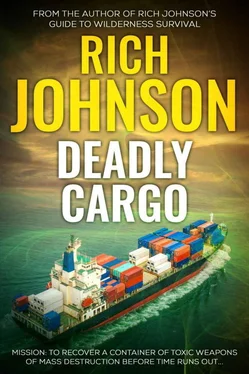In Sleagle’s office, Josh bent over the table and checked the manifest and cargo grid diagram that showed where each container was stacked. “The one I’m interested in is a red 40-footer with the serial number bravo, alpha, one, one, mike. According to what I’ve been told, it was one of the last containers loaded.”
“Then it would be right here.” The captain pointed to a spot on the grid map, and crosschecked against the manifest. “Yep, top of stack, starboard side. Right there in the front corner.” He looked up from the papers spread out on the table, straightened his back and exhaled hard. “The one you want was at ground zero, right where it looks like a bomb went off. I’d be surprised if that wasn’t the first box off the ship when we were smashed by that rogue wave yesterday.”
“Is there any possibility that it’s still on the ship? Maybe it collapsed into the crater when other containers beneath it tumbled out of the stack.”
“Well, anything can happen, Mr Adams, but if was I a betting man I wouldn’t lay too much on the table to back that theory.”
“Just the same, I’d like to have a look.”
Captain Sleagle drew a breath. “Must be important cargo.” He eyed Josh, hoping to jog a clue out of him. “Mind telling me who you work for and who this cargo belongs to?”
“The answer to both questions is the same. The government. I’m asking your permission to explore that pile of wreckage to find out if my container is there.”
“If the government is involved, I have a hunch you will do it with or without my permission. Be my guest. But, Captain Pfister, I want you to stand as a witness that I am released of any liability related to this venture.”
Pfister nodded. “If it ever comes to that, I’ll testify. You’re on your own, Mr Adams.”
“Can I have a copy of the grid map and manifest, so I can make sense of what I’m seeing down there?”
“No problem,” the captain said, handing the papers to Josh, who folded them and stuffed them inside his shirt.
“Can I get a few men to stand by with ropes, just in case I need a hand?”
“We are short-handed, and my primary responsibility is to get this ship back in shape to continue the voyage. But I’ll send one man from my forward deck crew, and a hundred feet of five-eighths double braid. That enough?”
It was less than Josh hoped for, but with a practiced poker face, trained to not show disappointment, he said, “I’ll take it. Have him meet me at the chopper. If you gentlemen will excuse me, then.”
Josh showed himself out of the bridge, down the ladder, and across the platform to where the helicopter was lashed. From his duffle bag, he retrieved a short-barreled Berretta, pulled back the slide just enough to verify that there was a round in the chamber, slid the clip out to check that it was full, then slammed it home and thrust the gun into the cargo pocket of his pants leg. Into a breast pocket went a short, rubber-coated flashlight, sized right for holding in his teeth.
By the time he was ready to go, the deck crewman was there with a coil of rope over his shoulder. “I hope you know what you’re getting into,” the man shouted over the noise of the wind.
Josh reached out a hand. “Hi, what’s your name?”
“Romero.”
“Well, Romero, If I’d known what I was getting myself into, I’d have become an actuary.”
Against the roll of the ship, the men scrambled forward the distance of a football field before coming to the edge of the wreckage. From up close, it looked worse than it did from the air or from the bridge. The forward stack had once been two levels higher than where he now stood on a ship-wide platform made up of containers stacked four high above the main deck. The bow stack was once eighty feet from front to rear, being composed of a mixture of 20- and 40-foot cargo boxes laid together like bricks.
Now, half of those top two rows were missing along the starboard side. And like a landslide, when the boxes on the right front corner collapsed overboard, the stack below was yanked out of position, and several of those lower containers had also disappeared, dragging the boxes next to them down into the crater. What stood before Josh was a huge hole filled with an avalanche of railroad car-sized steel boxes, thrown every which way.
“Let me have the rope,” Josh said. “You ever belay anybody before?”
Romero nodded. “Oh yeah, around here, rappelling is sometimes the quickest way to get from one place to the other.”
Josh quickly tied a bowline around his waist. “I’ll try to avoid rappelling, but I’ll use this as a safety rope. Let me have slack to move, but be ready in case I go over. I’ll yell if I fall.”
“Got it,” Romero said, taking the rope around the back of his waist, moving to a spot where he could take a seat with his heels propped against a ridge in the platform. “Belay on.”
“On belay,” Josh answered, then walked to the edge and disappeared over the side into the crater. He moved easily down the side of the first container, came to the bottom of the first descent, then turned and stared into the jumbled mess. The cargo boxes had tumbled sideways at angles that left small openings between them, leading into black holes.
A large wave pounded the ship from the side, and salt spray rained down on Josh. On the sharply angled wet metal, his feet slipped, and he went down hard, grabbing at the ridges on the side of the container, but unable to get a grip. The rope tightened around his waist, and he stopped.
“You all right down there?” a voice shouted from above.
Josh struggled to get his feet back under him. “Yeah,” he yelled back. “Sorry about that. Just a slip.”
“Thought you were going to let me know if you fell.”
“Well, let’s not count that one as a fall. Okay, give me slack, I’m going in.”
He pulled against the rope until he had enough slack to allow free movement, then he ducked through a small triangular space formed by containers lying helter-skelter. Deep in the narrow opening between tangled boxes, he came to a corner with markings on it. He turned on the flashlight and studied the serial number. With the other hand, he pulled the grid map out to study container numbers and positions. From the numbers, he could see that the container that formed the angled roof directly above him had been loaded at the top of the stack and three rows inboard from the position shown for BA11M.
I need to look farther to the right.
He refolded the map and crawled into the open. “Need more slack,” he called, then pulled the rope to him as he scrambled around the end of the next container that was lying at a severe angle.
“Three rows,” he muttered, digging his fingers and the toes of his shoes into small nooks on the wet steel walls and clawing his way toward the outboard side of the crater. Should have brought my Mad Dogs . “Slack,” he yelled, tugging again at the rope. On his rare days of leisure, he enjoyed recreational rock climbing, and his Mad Dog shoes fit his feet like a second skin, and had soft, sticky rubber wraparound soles that let him climb like a spider.
For the next ten minutes, Josh scrambled around the wild canyon of steel, repeatedly pulling the grid map out of his shirt and beaming his flashlight in dark crevasses to study serial numbers and compare them with what he was seeing around him.
“One more to go,” he whispered into the air as he crouched to duck through another dark chamber leading, he hoped, to the final row on the starboard side.
On hands and knees, with the flashlight in his teeth, he pulled at the rope and crawled forward. He felt the ship list heavily to starboard and knew a deep trough was passing beneath the hull. A heartbeat later, a solid flood of seawater cascaded through the black tunnel, catching him by surprise, filling his mouth with the sharp taste of salt, and washing him backward on the slippery metal.
Читать дальше












